Every month, two writers return to this blog. They do an essay each. They are loved, they are hated. In two years, this will all be over.
Don't wanna be here? Send us removal request.
Link
We decided to (belatedly) mark the end of the 2010s by writing about our twenty favourite things from it. You... um... may be able to guess what’s in the top spot, and Tim’s writeup makes for a lovely post-script to doing TWATD for pretty much the entire back half of the decade.
In all likelihood, this is probably our final transmission. We love you all. We’ll miss you.
12 notes
·
View notes
Text
Getting TWATD at the Wake, ii: The Eulogies
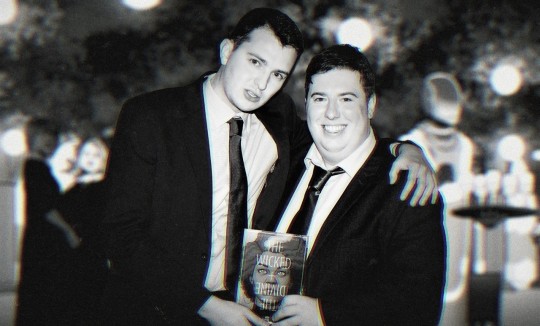
Every month, two writers returned to this blog. They did an essay each. For five years. And now it’s all over.
The Wicked + The Divine #45 came out a month ago, and we’re still at the metaphorical wake. In this part, we pick out two characters we haven’t written much about, consider the paths their lives ended up taking, and write their obituaries. It could get emotional.
Spoilers for... well, for the entirety of WicDiv, I guess, below the cut.

Tim: Endings are bittersweet things at the best of times, and for a series as preoccupied with death and heartbreak as The Wicked + The Divine, we were never going to reach a conclusion without shedding a few tears. Still, there are many ways in which #45 is a happy ending for several of the characters – and that’s truer for Aruna, the god formerly known as Tara, than possibly anyone else.
Looking across the span of the series as a whole, she is a character who has suffered abuse, indignity and manipulation. But here at the end, Aruna is free from many of the troubles that plagued her life both before and during her time as a god. I don’t know if the Aruna we see in 2055 is living her best life, but it seems infinitely better than we could have expected after #13, the issue which gave us a painful glimpse into a character who had remained a mystery up to that point.
Pre-Godhood, Aruna had been made to feel uncomfortable in her own body by sexism and misogyny. That feeling was amplified by her divine transformation and the increased celebrity that came with it, culminating in her begging Ananke for the mercy of death. But Ananke’s manipulation accidentally set up Aruna to transcend the cruelties inflicted upon her. As a miraculously preserved head, she was free from the burden of her body, and free to reinvent herself.
With the help of Jon, Aruna she was able to reject a new form when she wasn’t ready for one – and, once she was, to create one that existed beyond the constraints of traditional biology. Her story touches on themes of transhumanism, not an area that WicDiv has traditionally dabbled in, but one that has some interesting connections with the themes of people seeking immortality. As you might expect given the ideas of gender and bodily autonomy at play, it’s also easy to read through a queer lens.
I��m glad that, while it’s clear Jon and Aruna have developed a close partnership over the years, Gillen and McKelvie chose to leave the exact nature of their relationship open to interpretation.
Aruna’s previous discomfort with the spotlight, and Ananke’s subsequent exploitation of that fact, also ended up benefitting her in other ways. Her distance from the rest of the Pantheon meant she avoided jail time after the events of #44 (it probably helped that it’s hard to handcuff someone when they’re just a head).
You could also maybe draw a line between the sudden outpouring of appreciation following Tara’s death and the way she was able to successfully campaign for the Pantheon’s early release, performing benefit concerts and raising awareness. This goes some way to colouring the previously devastating ending of #13 in a new light, as the insincere chorus of Twitter observers become a platform Aruna is able to use for good.
There’s an important distinction, though – this time around, she was able to approach a musical career and fame on her own terms, as Aruna rather than Tara. Also, the fact that her ‘death’ wasn’t a permanent one doesn’t take away from the tragedy of it, or how the comic made us complicit in the culture that led to it.
Aruna’s story following her ‘death’ could be called WicDiv’s ultimate triumph. The old truism about suicide being a permanent solution to a temporary problem feels especially apt here. Ananke took someone who was miserable and vulnerable, and proceeded to place them in a situation that they couldn’t cope with. Ananke became Aruna’s sole source of ‘support’, isolating her from the other gods, amplifying her insecurities until Aruna felt the only solution was to take her own life.
Strip away some of the details, and the story starts to take on some truly dark parallels, but unlike so many real-life stories, there is a second act to Aruna’s tale.
Once the true nature of Ananke’s plans are revealed, Aruna is eventually able to escape her role in them, retake control of her life, and eventually thrive on her own terms. WicDiv may be a story that largely approaches death as a firm reality, but by giving Aruna a reprieve from her seeming demise, it allows us a glimpse of a real happy ending, in amongst the more complex feelings the final issue evokes.
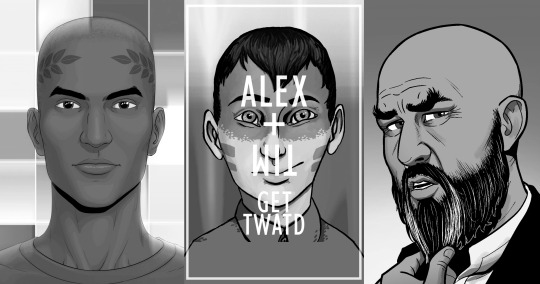
Alex: Aruna’s story is a happy one because she escapes the cycles that life locked her into. But the god I want to talk about, I’m not sure they ever did. Which might not be a terrible thing – it was always a little different, with Dionysus.
We don’t get much time with Umar before he goes all Olympian, but the moments we do get suggest there’s less of a gap between his two identities than there is for most of the other gods. He’s the guy who drives his friends down to London so they can get wasted on the way, who asks sensitive questions of strangers.
When he becomes Dionysus, the difference is mainly a question of scale. The group of people he’s trying to do right by gets bigger and bigger, and that makes this behaviour unsustainable. That first time we meet him, in issue #8, we get pretty much the whole Dionysus story. Dude takes on everyone else’s troubles, exerts himself to make them feel better, and makes it look breezy – only occasionally cracking and showing the weight of it all.
I’m not sure that ever really changes for Umar. He keeps using his powers to make people happy for a night, even as it starts to take a toll. He waits in the darkness, lets The Morrigan attack him, just to be there for Baphomet. He has faith in the power of the crowd, even as they crush him. He just keeps giving and giving, and it lands him in a coma.
This is Dionysus’ hamartia – the fatal flaw built into every one of WicDiv’s gods, the thing that ensures their downfall. As these things go, it’s not a bad flaw to have.
It marks him apart from the other gods. Gillen has talked about the Pantheon all being aspects of himself, his own flaws built out into characters, people he’s trying not to be anymore. But Dionysus’ flaw actually makes him someone to aspire to.
A spare Gillen quote from my Polygon interview that didn’t make it into the final article: “Umar is someone I'd love to be now… But Umar's a fictional character. Therefore, it's easier for him to be Umar than for Kieron to not be a shithead.” Even in the comic, we see how Dio’s behaviour is unsustainable – but to try and live that way, all of the time, in real life? It’s impossible.
I say this with authority, because in many ways I spent my twenties trying to be a Dionsysus. I’m an Inanna by nature – a pleasure seeker who tries to be kind but can sometimes forget that having the best possible time can have consequences on the people around them. (And, sidenote, it’s a fascinating twist on the archetypes that the god with these traits isn’t the one who, y’know, gave us the word bacchanalian.)
But, to be uncharacteristically nice about myself for a second, my idea of having a good time does tend to include bringing as many people along with me as possible. The version of me I like is the one who always opens up the circle on the dancefloor to sweep up strangers and stragglers. Or spot someone who seems left out and work to change that. Or pour hours into a project that’ll be seen by just a handful of friends, or just one.
I kind of buried that person this year.
This wasn’t an active choice, or something I was even conscious of doing at the time, but looking back I can see the reasons behind it. Firstly, because it’s not always clear whether people actually want these things done for them, or if it’s an unwelcome overreach, and that thought makes me to want up curl into myself and just die. And second, because I’m not good at knowing how to apportion effort, meaning it can involve frankly life-damaging amounts of preparation for very little payoff.
It’s not a sustainable way to live. Dio might be the best possible version of the WicDiv god, but he’s still someone sacrificing his self to become an idea. It kills him, eventually, and #37 shows how he’s remembered for it by the public, the people he gave everything he had to: ‘that guy on drugs’.
But eventually he is repaid by one of the recipients of his kindness, as a little bit of that selflessness rubs off on Baphomet. And Umar joins the rest of the Pantheon as they step back from their defining flaw, allow themselves to become more than an archetype. “I thought it was my job to save everyone,” Dionysus says, and I cry my little eyes out.
Maybe that was the moment I started to realise I’d been stepping back from that version of myself. Or maybe it was talking with Tim (my other, non-fictional model for the sort of person I want to be) about issue #45, when he explained how he read the older Umar: someone in whom all that kindness turned a little bitter. Aged like vinegar, not wine.
My reading is more hopeful than that, I think. The final issue trades in hints and suggestions of lives, but with Umar more than most. And personally, I fill in that blank with a different story: someone who has tempered his need to always put others first, and become more judicious about when and how and to whom he gives himself. And that? That is someone I’d really like to be.
33 notes
·
View notes
Link
Alex: So, having just done the link thing, I’m going to write about writing this a bit. I decided to keep myself out of the article as much as possible which means I’ve got a lot of messy personal feelings I never committed to paper (or Word doc, whatever). Prepare for a heavy dose of the first person.
I’ve been talking with Polygon about some version of this piece for three months now. Naturally, it all ended up coming together in a weird rush. I sat down with Jamie + Kieron last Friday, wrote the whole thing in one 12-hour sitting on Monday, and it went up on Wednesday. As someone who does most of their work for print magazines these days, I am very much unused to that kind of turnaround.
At the start of those three months, I was planning to make this my official retirement from comics journalism. For assorted reasons but mostly because, y’know, drama.
It would have been a nice circle. When I read the first Phonogram, it was at a time I was falling out of comics a little. It’s a common cycle, I think, and I would probably have wandered back – but Phonogram ensured I was paying close attention.
I first met the lads Gillen & McKelvie at the end of 2006, I think, over a table at a slightly shabby con in my hometown of Birmingham. I told them off for getting me hooked on Kenickie, and Kieron – bless him – basically splurted out his plans for the comic that would, nearly a decade later, become The Immaterial Girl.
The setting for this interview was a little different. We were on the fifty-second floor of the Shard, a few floors away from Baal’s apartment and temporary Pantheon HQ. McKelvie was fresh off a flight, in town for one night only to celebrate the comic being done with the London division of Team WicDiv. Gillen was wearing the trademark skull suit because, in truth, the Imperial Phase never ended.
(Honestly, it was a little like the three of us doing a cosplay recreation of one of the Pantheon Monthly interviews from #23, right down to the couple sat next to us attempting, with zero subtlety, to figure out who these rock stars were with a twitchy journalist pushing a recorder into their faces.)
Anyway, they kindly gave me two hours of their time. Team Phonogram Team WicDiv have always been good like that – the whole ‘lowered stage’ thing – even if I’ve never quite figured out how to navigate it, the odd thing of being acquaintances with someone you also know incredibly personally through their work. And that’s before you throw in a professional relationship – I don’t think there’s anyone, in comics or games or any of the other things I write about, that I’ve interviewed more than Kieron, mostly because he’s normally stupid enough to say yes.
Also, me doing this job is kind of their fault in the first place. Constantly checking Gillen’s blog to find out when the next Phonogram was coming out led me to Rock Paper Shotgun, the PC gaming site he co-founded the next year. Reading that site was thing that convinced me I had to be a games journalist.
It was only during WicDiv’s life span that I started writing about comics. Professionally speaking, anyway – I’ve been running my mouth off about everything I watch/play/read/etc since roughly the first moment I met the internet.
It was writing this blog with Tim which convinced me I was good enough to knock on the hallowed doors of ComicsAlliance. I got there just in time to become comfortable before the whole site was demolished.
It was that closure which led me to other venues, taking in refugees from the ComicsAlliance exodus. CBR, where I tried and failed at being the populist word-machine that site requires, and Polygon, where comics editor Susana Polo was open to stuff that was a bit weirder. The first article I ever wrote for Polygon was a piece abandoned during the ComicsAlliance closure. It quoted Kieron, naturally.
So, yeah, calling this my last piece of comics journalism would have been a nice way to close the circle. And frankly as I keep alluding to, I’m crazy busy at the moment. I tried to write the piece in that mindset, treating it like my final word on comics.
It would have been a good retirement. But honestly, rushing this piece out was just too much fun, and I’ve already started to think of the next thing I might want to write. This is good, I think – making life decisions based on the pretty patterns they’d make is exactly the kind of thing that WicDiv is designed to talk us out of.
Alex: So this is a whole thing. Polygon gave me a stage to say goodbye to WicDiv, with a nice big interview feature. Many words from Kieron Gillen + Jamie McKelvie both within, but the one I reckon best summarises the whole thing is this, from McKelvie:
“Making a book this long — which neither of us have ever done before and probably will never do again — you are trapped in the decisions you made five years ago. And you’re not the same person you were five years ago.”
I started to write about writing it, and that unravelled into a whole thing I’ll post later, but for now: go, read the article. People seem to be liking it, which is certainly better than the alternative.
146 notes
·
View notes
Link
Alex: So this is a whole thing. Polygon gave me a stage to say goodbye to WicDiv, with a nice big interview feature. Many words from Kieron Gillen + Jamie McKelvie both within, but the one I reckon best summarises the whole thing is this, from McKelvie:
“Making a book this long — which neither of us have ever done before and probably will never do again — you are trapped in the decisions you made five years ago. And you’re not the same person you were five years ago.”
I started to write about writing it, and that unravelled into a whole thing I’ll post later, but for now: go, read the article. People seem to be liking it, which is certainly better than the alternative.
146 notes
·
View notes
Text
Getting TWATD at the Wake, i: WicDiv #45 Reactions
Every month, two writers have returned to this blog. They did an essay each. For five years. And now it’s all over.
The Wicked + The Divine #45 is out, showing us what the gods did after the cycle ended. We’re following their lead and breaking our own rules. We won’t be writing the normal essays about the issue. Less a remembrance of WicDiv’s death, and more a celebration of its life.
Let’s start with our initial reactions. Once we’d both read the issue, we sat down and discussed our feelings on where everyone ended up, and how the story finished. Here are the highlights of that conversation.
Spoilers for... well, for the entirety of WicDiv, I guess, below the cut.

Tim: So here we are. After five years and 45 issues, we reach the end of The Wicked + The Divine. Overall, did it feel like a satisfying ending to you?
Alex: After #44, which I enjoyed but didn't really feel like an ending to me... this issue was pretty much exactly what I wanted from the end of this story. I liked where every character ended up, and I got a bit weepy at the sheer optimism of them still being alive and making a positive difference in the world.
What about you?
Tim: I was more or less the flip of that. For me, the emotional climax was last issue, and this is more of a coda that works beautifully in some ways and stumbles a little in others. That might just be my expectations shaping my reading though - we've both sunk a lot of time into thinking about this series, so we're always going to come in with baggage.
Alex: Oh, absolutely. But I suspect our own sets of baggage aren't necessarily the same. WicDiv is a broad church, and I think we've always got slightly different things from it. And I wonder if that informs our different reactions?
Tim: I would be interesting to dig into, but I worry this whole thing could turn into a mutual therapy session.
Alex: Hah. I mean, that's what this whole comic is for, right?
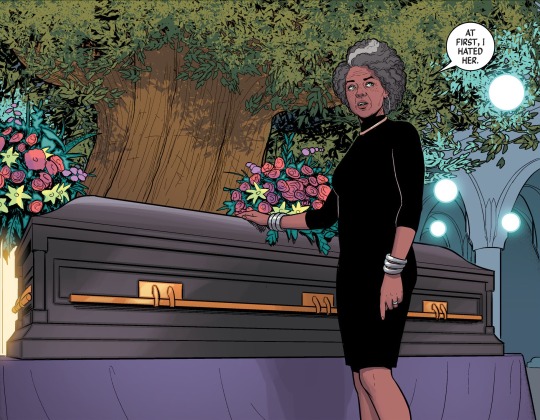
Tim: This issue keeps the focus relatively tightly on Laura. Do you think WicDiv overall was always her story?
Alex: I actually disagree with that statement a little. The big twist of this issue, for me, is how much it was Cassandra's story.
As I slowly realised who the funeral was for (a process extended out a little thanks to the slightly blurry review PDF obscuring the name on the programme), I was actually kind of furious. Cassandra's always been one of my favourite characters, and she's been a little absent from the last couple of issues.
But, at the halfway point of the issue, I think that starts to show itself as intentional. In the end, Cass gets to give her own eulogy, and she's probably got the most lines of anyone in the issue. Even when she's not around, people are talking about her. It's basically “Where’s Poochie?” meets a Cassandra-themed Bechdel Test. And I love it.
Tim: Yeah, it's essentially a Cass sandwich between two slices of Laura bread. It effectively makes their relationship the central figure of the final issue, which is fascinating given that this issue also introduces a whole new wrinkle to the dynamic that we've seen them develop over 44 issues.
I'm sure that there are plenty of people out there who shipped them, but I've got to say, Laura and Cass ending up married sort of blindsided me. I loved their friendship throughout the series, and the way they slowly opened up to each other, but I can't say I picked up on any romantic vibes between the two. Am I being a clueless straight dude here?

Alex: I think that, for all WicDiv's love of foreshadowing, their relationship isn't something that has been signposted much during the series. There is Laura's line in #43 about jealousy and envy, but I think this is more about the vast period between these two issues. A relationship that was one thing, organically becoming another. Rather than – to pick another comic which was hugely formative on us both and has a weirdly similar ending – the Yorick/355 thing of 'oh, this is what that always was'.
Tim: Yeah, I suppose in a way it speaks volumes about just how much was jammed into the two years that we followed those characters through, and how much more you can fit in a time span 20 times longer. But I do worry that it slightly undermines the Laura/Eleanor moments in #44.
Alex: That might be it, actually – Laura and Eleanor were the bits of #44 I found least interesting, because it's a dynamic I'm just not that invested in. I do agree that it feels narratively messy to bring that relationship up only to immediately push it aside, but I feel like that's part of the point – and it's probably easier for me to accept, because I was never aboard that particular ship.

Tim: I can definitely accept that a the pairing of Laura & Eleanor feels too chaotic to last, while a Cass & Laura marriage would be built on rock.
How about where everyone else ended up? Were there any surprises that stood out to you?
Alex: I think the one that surprised me most is Aruna (ex-Tara) and Jon (ex-Mimir). Not where they ended up, exactly – Jon building her a body is something I've seen multiple people on Tumblr crossing their fingers for – but rather how much is done with how little.
They're the gods we got to know least, because of when and how they were each introduced, and they don't get much page space here, but I still Got It. The abstraction of Aruna's body, and Jon inevitably growing into his dad but learning from his mistakes... those are both really lovely endings for those characters.
What about you?
Tim: Aruna is obviously the most visually stunning, and I love the design that McKelvie has created. It reminds me of something I can't put my finger on, and for some reason it means that when she started playing guitar, I was like "oh, it's St Vincent". Make of that what you will.
Alex: That's a nice bit of pop-cultural synaesthesia. (…synthaesthesia?)
Tim: Otherwise, I found Umar's evolution really interesting. It felt like some of his selflessness had curdled into anger a little, and seeing him echo Cam was a real heartbreaker. That and his dynamic with Cass - he felt like someone with a whole bunch of tragedy and regret draped around him.
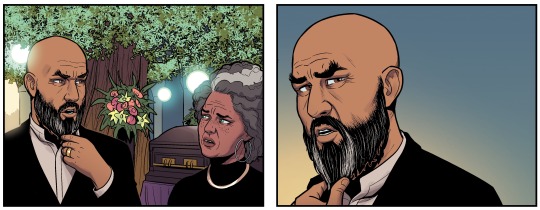
Alex: That's a really interesting take on him. And it's testament to how open these characters' fates are left – I didn't get that vibe off him at all, but it makes complete sense, and I can now see it in the severity of his design.
But the closure of that final plot loop, with the Morrigan prophecy, was definitely something that stuck out to me. It was painful, and I'm not sure how I feel about it. The idea that he's married, but it's to someone who – canonically, word of literal god – isn't the love of his life? Oof.
Tim: Here's a question - would you want to see more of either the 2055 cast or the times in between, or do you think this snapshot was enough? Like, if this had been a final arc, instead of a final issue.
Alex: In the run-up, I assumed this issue would be structured like: ‘five years, and ten years later, and...’. So I definitely thought we’d get more of that stuff than we did.
Honestly, I love these versions of the characters a lot, but I think spending longer with them could only diminish the impact. And I like that there's a certain level of 'nope, you don't get to see this'. It reminds me of what Laura tells us, about her abortion: “You don’t get details.”

Tim: And yeah, I agree. As much as I have questions I'd love answered, the answers I speculate on in my head are probably as satisfying as actually seeing them on the page in some ways. Knowing that the characters got to live on and make choices and mistakes is, in a lot of ways, enough.
We've spoken numerous times before about how WicDiv is a book obsessed with cycles and systems. Do you think the characters have well and truly broken free from what was trapping them?
Alex: Absolutely. I think that's what I found so moving about this issue – their lives moving forward, unencumbered by all the things they kept being dragged back into over those two years. It doesn't mean they're perfect people, in the final reckoning, but they do get to be whole people.
Tim: There's definitely a sense of somewhat messy real lives outside of this moment, something that's hard to convey in such a small space. Eleanor seems to be the one holding on to her iconic poses and perfect sarcasm the most, which absolutely makes sense, but even she feels like someone who has changed and evolved. They are all free to colour outside the lines now, which isn't always pretty, but it's true.
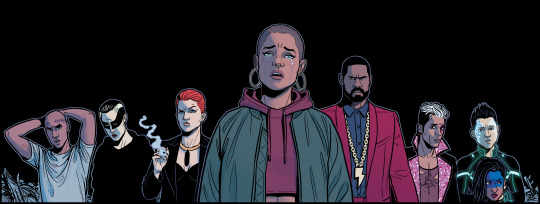
Alex: So we're agreed that the gods all managed to break free of their cycle. But as WicDiv has been coming out, the two of us have also found a neat little groove to live in. How do you feel about that going away?
Tim: This has been a wonderful community to be part of, and I've rarely if ever stumbled across negative parts of it, which is pretty extraordinary for a fandom in the modern age. I will definitely miss watching people react to and interpret new issues as they come out, and I hope the interesting voices that I've discovered through this keep writing about other things that inspire them. How about you?
Alex: It's a weird mix of sadness and relief, because our relationship with this comic is so tied up with thinking and reading and especially writing about it. Both of our lives have changed a lot over the five years WicDiv has been coming out, and in particular we've both been hella busy of late, so I've definitely felt that monthly cycle starting to bite into my neck.
But who am I kidding? I give myself about six weeks till I start missing it all, and send you one of my famous late-night texts, the ones that start "Tim, I've had a bad idea..."

28 notes
·
View notes
Photo
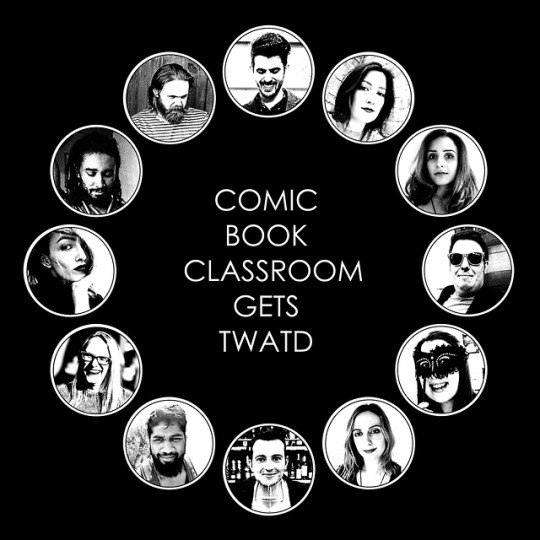
Behold, the twelve gods of Comic Book Classroom Gets TWATD.
(Listen to the podcast on Spotify here or on Soundcloud here or on Apple Podcasts here or, y’know, just search yr podcast app for ‘Comic Book Classroom’.)
Our team, clockwise from top:
Michael Garvey-Eckett (Woden + writing)
Amy Garvey-Eckett (Morrigan, Amaterasu + writing)
Sabina Stent (Persephone)
Tim Maytom (Baphomet + writing)
Imogen Spencer-Dale (Ananke/Minerva)
Emma Graveling (Tara)
Alex Spencer (Mimir + writing)
Umar Ditta (Dionysus)
Mia Henry (Urðr)
Laura Holland (Lucifer)
Adam Sherif (Baal, Inanna + music)
Robin Harman (Editor extraordinaire)
They’re all really flippin’ good.
7 notes
·
View notes
Photo

Look at us, we made a podcast!
Tim + Alex teamed up with Comic Book Classroom, a podcast that recaps histories of comics titles, teams and characters, for something a bit special. 44 issues of The Wicked + The Divine, as a 45-minute radio play, with jokes and sketches and really far too much thought poured into it.
It’s called Comic Book Classroom Gets TWATD, and we’re incredibly proud of it. With the final issue dropping next week, this is the perfect way of reminding yourself which bits to cry at.
Listen to it on Spotify here.
Or on Soundcloud here.
Or on Apple Podcasts here.
Or, y’know, just search your podcast app of choice for ‘Comic Book Classroom’. You won’t regret it – unless you’ve got an aversion to puns, in which case this podcast may be detrimental to your health.
60 notes
·
View notes
Text
Once Again
We return. WicDiv is in the final stretch, and so is TWATD. The first of our two essays on #44, focusing on the issue’s echoes and callbacks. Spoilers – like oh so many spoilers – below the cut.
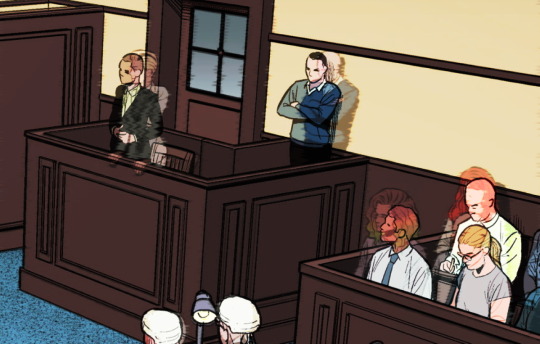
Alex: Remember issue #14 of The Wicked + The Divine? The Woden remix issue? I reckon, with a bit of ingenuity, you could use the same method – cutting up panels from elsewhere in the series, pasting them in new contexts – to make a fan edit of #44, front to back.
The issue is crammed tight with echoes of old images. It put me in mind of Avengers: Endgame, the way it’s constantly calling back to moments from the past twenty-one movies, and the criticism of that tendency as ‘fan service’.
In WicDiv, this echoing feels inevitable. The series has always had its repeating motifs. Going back to the very first issue, we get a whole host of phrases we’ll be seeing over and over: “Once again, we return.” 1-2-3-4. “I’ll miss you.” “Don’t.” Kllk. And images, too – from that very first cover, with its carefully-framed headshot echoed on the first page inside, something the first arc plays with again and again.
But what is the purpose of it, other than reminding us of something we’ve seen and loved in the past?

To answer that, let’s look at some specific examples – beginning, as the issue does, with Lucifer. From the very first panel of her, stood in a variation on her classic power pose, Luci is pretty much playing the Greatest Hits here. She lights a cigarette on her own inferno, holding a familiar eyebrow-cocked expression. She teases a finger-click, taking us back to the courtroom. Her threat of violence to Laura, framed side-on, recalls Lucifer’s murder in issue #5, and Ananke’s millennia of practice for that moment as seen in #36.
Lucifer wraps herself in motifs and echoes possibly more than any other character this issue, and it feels like armour. She’s the one member of the Pantheon clinging on to the lie of godhood, playing her role because it protects her from the consequences of what she’s done. She’s perpetuating Ananke’s cycle, and so she reaches for the easy iconograpy, the tropes, of the Lucifer myth.
It’s worth noting that most of these images are inverted. In that last example, Lucifer stays on the same side of the panel, but switches her role, from victim to the position of power. Even the colours of her outfit are flipped – white to black, blue to red – and her pose too, with arms up rather than down. Tim is going to be exploring the Two Girls in Hell sequence in his essay, so I won’t go too deep on that, except to point out that when Laura saves Luci, it’s by taking Ananke’s “I’ve missed you” and making it sincere.
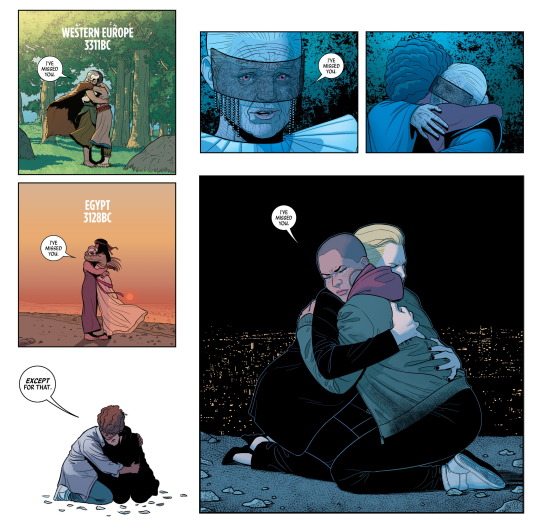
#44 does this over and over, taking a familiar motif and inverting the meaning. We’ve heard a lot of variations on “it’s okay”. Minerva, begging Ananke to tell her it’s going to be okay, a conversation we’ve likely all had with ourselves at some point. Its answer at the end of that arc, laid out in black and white: “It was never going to be okay.”
Here, it’s Dionysus who wields the phrase, and for the first time “it’s okay” isn’t a lie. Dio isn’t pretending that death won’t come for us all, or that Minerva’s situation is anything less than fucked. Instead, he’s encouraging her not to fear the inevitable. He isn’t offering denial, but acceptance.

Then there’s the other character interaction Minerva has this issue, which inverts something familiar in a much uglier way – her relationship with Baal. Time and time again, we’ve seen Baal wrap his arms around Minerva’s tiny frame. It’s indicative of the role he thought he played in her life, somewhere between bigger brother and father figure, but he now knows this was just a way of manipulating him.
In #44, Baal takes Minerva in his arms one last time, with very different intent. That big hand, able to cup her entire head, used to comfort or protect her, is used instead to smother. That tight embrace becomes a murder weapon. The contrast turns what could be a triumphant moment – this is the defeat of WicDiv’s big bad, after all – into an unsettling one.

Of course, it wasn’t much better the last time WicDiv’s big bad got taken out, as #44 is ready to remind us. The issues it draws from more than any other are the series’ first, and its midpoint. #22 and #44 are both stories about what happens when you beat the minions and get to the dark lord in their tower to find them helpless.
Here the repeated image – Laura with arm outstretched weighing up whether to kill the villain – acts as a kind of mental hyperlink. We’ve been here before. Twice before, in fact, just a couple of issues apart. (The second also introduced the idea of Woden’s kill-switch video release, which is vitally important to where this issue ends up.)
Both times, Laura hesitated – and then acted anyway. Our expectations are primed for the same thing to happen again. But, as any comedian will tell you, you set up pattern on the first and the second beat, then break it on the third.

This time, Laura hesitates – and is talked down. We see how much she’s grown as a character, because she’s put in the exact same situation, right down to the composition of the image and the people around her – Cassandra always hovers over her shoulder like a goth Jiminy Cricket – but the outcome is different.
I’ve mentioned fan service already, but there’s an alternative term I’ve been skirting around: payoff. A good final chapter (depending on how you view the epilogue) should bring together the threads of the story up to that point. That’s as true of WicDiv as it is of Endgame, as it is of a Dickens novel.
I do still worry about accessibility – how much of this comes across if you’ve only read each issue once, like a normal person – but maybe that’s not giving enough credit to the fantastic work of Jamie McKelvie + Matt Wilson making these images so immediately iconic, so mentally sticky, that you can recognise their vague outline five years later. As Tim suggested when I raised this question, these connections are likely kicking around in the subconscious of a more casual reader, even if they couldn’t put together the full serial-killer wall I’m making here.
There’s another thing, too. The fact that all these echoes are backing up feels indicative of what Laura is trying to do: breaking the cycle. Ananke’s six millennia-long plan is in its death throes, and this is one final twitch. Over and over, the issue shows that while the circumstances and tools might be the same, intent can change the meaning and outcome.
I suspect we’ll be free of echoes next issue, for the first time. I wonder if I’ll miss them.

Enjoyed this essay? You’ve got like 24 more hours to throw a bit of cash our way over at patreon.com/timplusalex, before we close down the Patreon in August. Think of it as a going-away present. Or a tip.
49 notes
·
View notes
Photo
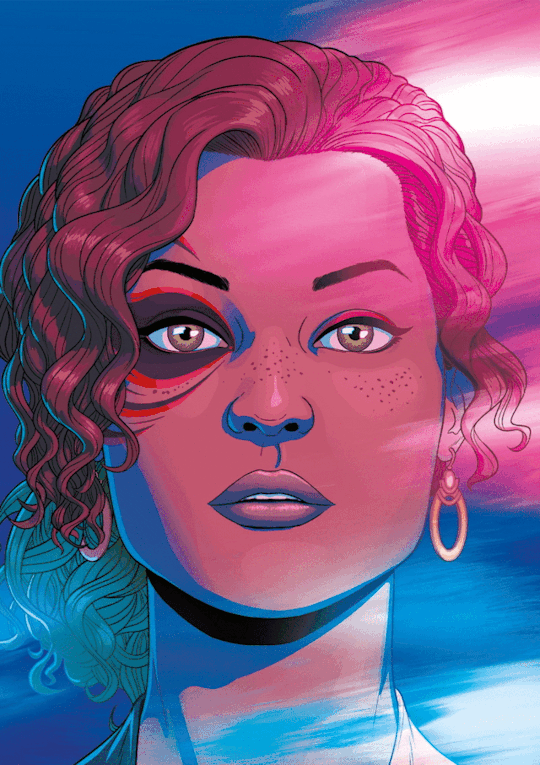
The Life & Times of Laura Wilson
548 notes
·
View notes
Photo
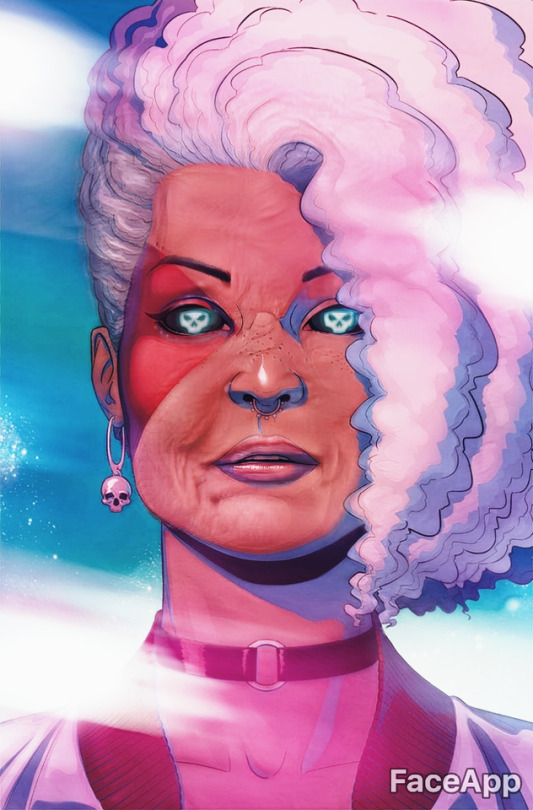
(based on an original idea by friend of the blog Robin J. Harman)
29 notes
·
View notes
Link
Alex: As you may already know, Tim + I have a Patreon to help support TWATD, and the rest of our blogging projects. For assorted reasons (detailed in the linked post), we’ve decided it’s time to bring the Patreon to a close at the end of this month.
Tim + Alex Get TWATD (and most of our other projects) will be continuing, just at a slower pace and without bonus bits.
If you’ve ever considered pledging and didn’t get round to it... Now could be a good time to throw in a one-time payment.
And, as one final over-committing-self promise: if we pass the $100 mark during these last couple of weeks, I’ll make one last TWATD ebook. I think I’ve got a fun idea.
4 notes
·
View notes
Link
Tim: This month’s PanelxPanel is focused on The Wicked + The Divine, and I was lucky enough to be included as one of the writers exploring the series as a whole. My article takes a look at the storytelling that McKelvie and Wilson achieve using just the covers.
As always, Hass has put together an amazing magazine that delves into the art and craft of comics, and anyone who reads this blog is going to find plenty to enjoy in this issue.
35 notes
·
View notes
Link
A quick plug for the other big Tim + Alex blogging project: our film-by-film reevaluation of the Marvel Cinematic Universe.
This time out, the movie we’re looking at is Guardians of the Galaxy. And, frankly, reader? We do not care for it.
3 notes
·
View notes
Photo

297 notes
·
View notes
Link
Our Katamari of TWATD essays continues to roll onward, scooping up Imperial Phase Part II as we slowly progress in offering all our previous work in an easier-to-navigate format.
Our archival efforts have been timed to coincide with Juliette’s #oncemorewereturn reread project on Twitter. We encourage you to check out the hashtag for plenty more interesting thoughts and observations as the series draws closer and closer to its conclusion.
This week: as we reach “Imperial Phase, Part II”, we take a look at the Pantheon's ennui, break down the nature of performance in WicDiv, and say goodbye to a few more gods... Take a look, and we'll be back soon with another arc's-worth of essays.
6 notes
·
View notes
Link
We're back, building up our very own Library of Alexandria made entirely of TWATD essays. However, instead of the Dewey Decimal system, we just collect them by story arc. We think it's cleaner.
We originally timed this to coincide with Juliette’s #oncemorewereturn reread project on Twitter and we think we're still on track. We encourage you to check out the hashtag for plenty more interesting thoughts and observations as the series takes another step closer to the end.
This week: we hit the Pantheon's “Imperial Phase, Part I” and our essays attempt to tackle everything from Baal's relationship with responsibility to Woden's trip into the Underground. Something for everyone to enjoy, assuming you're reading this relatively obscure comic!
4 notes
·
View notes
Link
Once again, we return to our archive of TWATD essays, organised into arc-by-arc collections.
This one was meant to go up last week, but Alex is the organised one of our dynamic duo, and he's currently in San Francisco, so it's very much the B Team running the ship here. Thankfully, Juliette’s #oncemorewereturn reread project on Twitter doesn't seem to have powered too far ahead of us, so we should be back on schedule shortly.
Anyway, enough with the excuses. This collection covers “Rising Action”, and for WicDiv's punchiest arc, we've kept it relatively brief, with essays on how the use and presentation of their godly abilities changes the Pantheon's characterisation, how WicDiv tackles the divide between action and violence, and a couple of other tasty morsels. All can be found here!
5 notes
·
View notes